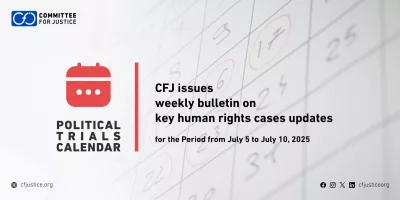The “Committee for Justice” (CFJ) stated that the death sentences issued in Egypt by courts that do not meet fair trial standards represent a blatant violation of justice principles and both local and international laws. CFJ also pointed out that these sentences pose a serious threat to the right to life, one of the most fundamental rights guaranteed by international charters and treaties signed by Egypt, which are legally binding. The committee emphasized that these rulings negatively impact citizens’ trust in the integrity and independence of the Egyptian judiciary and raise doubts about the state’s commitment to ensuring justice and protecting human rights.
These criticisms come after the Third Circuit of the Criminal Court, convened at the Badr Courts Complex, presided over by Judge Wagdi Mohamed Abdel Moneim and accompanied by Judges Wael Omran and Diaa Hamed Amer, issued death sentences by hanging for two defendants in case number 31369 of 2023, Al-Marg Criminal Court, commonly known in the media as the “Al-Marg First Grace Church Bombing Cell.”
The court sentenced both (Mohamed Khaled Ibrahim Amer and Ahmed Karim Kazem Sadiq) to death, after referring their papers to the Grand Mufti for his legal opinion. The court also sentenced defendants (Mohamed Abu Zeid Karam Mohamed and Abdullah Mohamed Abdullah Mohamed) to life imprisonment.
Additionally, four other defendants received 10 years of rigorous imprisonment, including (Abdel Nasser Gamal El-Gazrawi Saadallah, Ahmed Samir Mamoun Ahmed, Hiba Mohamed Idris Mohamed, and Nahla Ali Abdel Maqsoud El-Sayed). Six other female defendants, namely (Aya Ahmed Mohamed El-Embabi Hassan, Sundus Ahmed Ali Abdel Ghani, Nasiba Sayed Ahmed Genedi, Marwa Ahmed Hussein Metwally, Sara Raafat Mohamed Sherine Ahmed, and Zainab Sayed Atiya Hassan), were sentenced to five years of rigorous imprisonment. The rulings also included placing all defendants on the terrorist and terrorist entity lists.
The case began on February 27, 2023, when the National Security Forces arrested defendant Mohamed Khaled Ibrahim and his wife, Hiba Idris, from their home in the Dar Al-Salam area. This was followed by more arrests of several men and their wives, who were investigated for joining a terrorist organization founded by the first defendant, Mohamed Khaled Ibrahim. The Public Prosecution charged the defendants with joining a terrorist group aimed at disrupting public order, endangering societal safety and security, and harming national unity and social peace.
In this context CFJ asserts that the sentences were issued by an exceptional court, the Supreme State Security Criminal Court, which lacks the minimum recognized international standards of fair trials.
CFJ believes these sentences were primarily based on investigation reports submitted by National Security officers without presenting any tangible material evidence. The Egyptian Court of Cassation has rejected this approach in many previous cases, considering that relying solely on investigations without additional evidence is insufficient to issue judicial rulings.
Therefore, CFJ calls on the Egyptian authorities to halt the execution of the death sentences in this case and other similar cases, emphasizing that this is the top priority in the path to reforming the criminal justice system in the country. The committee stressed that the death penalty represents a waste of the right to life, and final sentences should only be issued after trials that meet fair trial standards.
CFJ also calls for a retrial of the defendants before a natural judge, rather than before exceptional courts like the Supreme State Security Criminal Court. These trials must provide all legal guarantees for justice, including the right to defense, submission of evidence, and handling cases with complete neutrality and independence.
CFJ further urges Egypt to review its anti-terrorism laws, which suffer from ambiguity and the application of vague standards that can lead to widespread human rights violations. It calls for these laws to be amended to ensure they align with international treaties and charters that protect fundamental rights and freedoms.
Additionally, CFJ calls on Egyptian authorities to release the defendants in this case pending a final ruling on the charges against them, as a first step towards achieving justice and ensuring a fair trial.
CFJ reiterates its call for the Egyptian authorities to permanently halt the implementation of the death penalty and replace it with less severe punishments that align with international human rights standards. It notes that the death penalty does not allow for the rehabilitation of individuals or the realization of true justice and urges serious consideration of the international requests calling for the abolition of the death penalty.
CFJ also urges the international community to pressure Egypt to halt political executions and ensure respect for human rights, as well as to provide remedies for the families of defendants who were executed after unfair trials.






